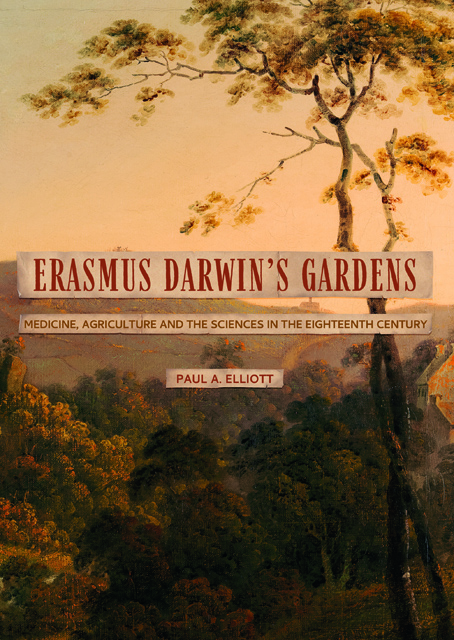Book contents
- Frontmatter
- Contents
- List of Figures
- Acknowledgements
- A Note on Plant Names and Identification
- Introduction
- 1 Lichfield and Derby Gardens
- 2 Medicinal Plants and Their Places
- 3 Agricultural Improvement: Enclosure and the Application of Science and Technology
- 4 Vegetable Physiology, Technology and Agriculture
- 5 Vegetable Pathology and Medicine
- 6 Among the Animals
- 7 Animal Diseases
- 8 ‘Eating of the Tree of Knowledge’: Forestry, Arboriculture and Medicine
- 9 Trees in the Economy Of Nature
- Conclusion
- Select Bibliography
- Index
- Garden and Landscape History
- Frontmatter
- Contents
- List of Figures
- Acknowledgements
- A Note on Plant Names and Identification
- Introduction
- 1 Lichfield and Derby Gardens
- 2 Medicinal Plants and Their Places
- 3 Agricultural Improvement: Enclosure and the Application of Science and Technology
- 4 Vegetable Physiology, Technology and Agriculture
- 5 Vegetable Pathology and Medicine
- 6 Among the Animals
- 7 Animal Diseases
- 8 ‘Eating of the Tree of Knowledge’: Forestry, Arboriculture and Medicine
- 9 Trees in the Economy Of Nature
- Conclusion
- Select Bibliography
- Index
- Garden and Landscape History
Summary
Beginning and ending in two botanic gardens at Lichfield and Kew, as Erasmus Darwin did in The Economy of Vegetation, we will conclude by highlighting some of the main themes that have emerged in our analysis of his approaches to gardening, botany, horticulture, tree cultures and farming, especially as expressed in Phytologia. These include the role of critical personal observations, medical practice and family members, patients and friends in nurturing his ideas and the usage he made of his body as an experimental tool to investigate potential novel foodstuffs. Secondly, we will examine some of the short-term and longer-term impacts that his contributions to these endeavours had, including the stimulus his arguments concerning agriculture and the agency of animals and plants provided to writers and scientists such as his grandson Charles Darwin and the chemist Humphry Davy. Finally, we will take a stroll with Darwin through the royal botanic gardens beside the Thames, encountering George III and Queen Charlotte, exploring some of the international dimensions of his medico-botany and presenting an offering to Hygeia, Greek goddess of health, in her sacred grove.
Darwin’s The Loves of the Plants (1789) and The Economy of Vegetation (1791) captured the imagination of late Georgian society partly because of the combination of poetry and illuminating scientific notes. Of these, the long essays on botany attracted much attention. As his grandson Charles Darwin remarked, their author’s success ‘was great and immediate’; his grandfather made much money from the publication and there were various British and foreign editions. Contemporaries such as Horace Walpole hailed Darwin’s ‘most beautifully and enchantingly imagined’ creation, while Richard Lovell Edgeworth claimed that sections ‘seized hold of his imagination’ to such a degree that his ‘blood thrilled back through his veins’. The young poets Samuel Taylor Coleridge, William Wordsworth and Percy Bysshe Shelley were initially excited and inspired, even if they later turned against Darwin’s style, while the older generation of poets, including William Cowper and William Hayley, were equally enthused.
The presentation of gardening, botany and horticulture in the epic poems and Phytologia had a major impact on how these endeavours were portrayed in literature and also helped to make picturesque botanical gardens more fashionable.
- Type
- Chapter
- Information
- Erasmus Darwin's GardensMedicine, Agriculture and the Sciences in the Eighteenth Century, pp. 291 - 314Publisher: Boydell & BrewerPrint publication year: 2021

